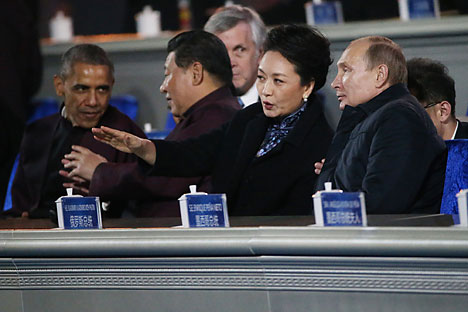
Russian media discuss the results of Vladimir Putin’s visit to China. Source: Konstantin Zavrazhin/RG
Nezavisimaya Gazeta writes that global attention has been riveted on the APEC forum due to expected meetings between Chinese President Xi Jinping and Japanese Prime Minister Shinzo Abe, on the one hand, and Russian President Vladimir Putin and U.S. President Barack Obama, on the other.
The Russian and U.S. heads of state have managed some “brief meetings,” and their Japanese and Chinese counterparts also conversed. However, both Tokyo and Washington remain opposed to China boosting its position in Asia, the newspaper reports.
Victor Pavlyatenko, a senior fellow at the Institute of Far Eastern Studies at the Russian Academy of Sciences, told Nezavisimaya Gazeta that China and Japan have taken the negative consequences of the conflict situation into account. According to the expert, “for China the dialogue between the two leaders is an important step.”
No less attention has been focused on upcoming talks between Xi Jinping and Obama. China’s main newspaper People’s Daily has already written about what Beijing can expect from the negotiations: The United States and China need to “build a new kind of relationship.” However, China is concerned by Washington’s decision “to reconfigure its strategy in the Asia-Pacific region.”
According to Nezavisimaya Gazeta, in recent months the White House has had new grounds for discontent with Xi Jinping’s course – China is becoming too close to Russia. The U.S. is seriously alarmed by the friendship developing between Moscow and Beijing.
Gazeta.ru discusses the results of Russian-Chinese negotiations held as part of the APEC summit. All eyes have been on Vladimir Putin’s visit to China. Expectations have been high surrounding the Russian president’s speech at the forum, particularly regarding Ukraine and the current geopolitical situation.
In contrast with his recent statements in Sochi, this time Putin’s speech was very calm and measured, Gazeta.ru reports. The Russian president once again attempted to convince foreign businessmen that they can do business in Russia. He also tried to explain that the current state of affairs in the Russian economy – particularly the situation with the ruble – is not as dire as it may seem.
One of the central events during the negotiations was the signing of a memorandum on natural gas supplies along the so-called “western route”. According to Gazeta.ru, Russia and China inked a contract back in May for 38 billion cubic meters of gas to be sent along the “eastern route” (the Power of Siberia pipeline) per year over the course of 30 years.
In the coming months, the main event will be agreements with Asian investors to create joint ventures in the Far East for the purpose of manufacturing agricultural products and logging. Citing Kirill Dmitriev, the head of the Russian Direct Investment Fund, Gazeta.ru reports that not only Chinese, but also South Korean and Singaporean investors may come to Russia.
European experts are warning of a significant rise in military tensions between Russia and NATO, the Kommersant daily writes. According to a report by analytical center European Leadership Initiative, the Ukraine crisis is to blame.
Kommersant reports that 40 dangerous incidents have occurred (mostly in the air) between Russia and NATO in recent months, three of which could have caused injury or led to armed conflict. According to the report, this year NATO planes have taken to the skies to intercept Russian aircraft more than 100 times, which is triple the number of such incidents that occurred in 2013.
Furthermore, the report refers to alleged violations of NATO airspace, cases of risky air maneuvers, flights at low altitudes over NATO ships, attack simulations, and “other dangerous and provocative incidents.” The majority of these incidents took place in the Baltics, as well as in the Arctic Circle, the Black Sea, and along the U.S.-Canada border.
However, sources at the Russian Defense Ministry told Kommersant that Russian planes have not once violated the airspace of other countries. The ministry attributed heightened air force maneuvering to the pilot training schedule. According to Kommersant’s Defense Ministry source, Russia has stepped up air patrolling of the Russian-Ukrainian border “for obvious reasons.”
All rights reserved by Rossiyskaya Gazeta.
Subscribe
to our newsletter!
Get the week's best stories straight to your inbox